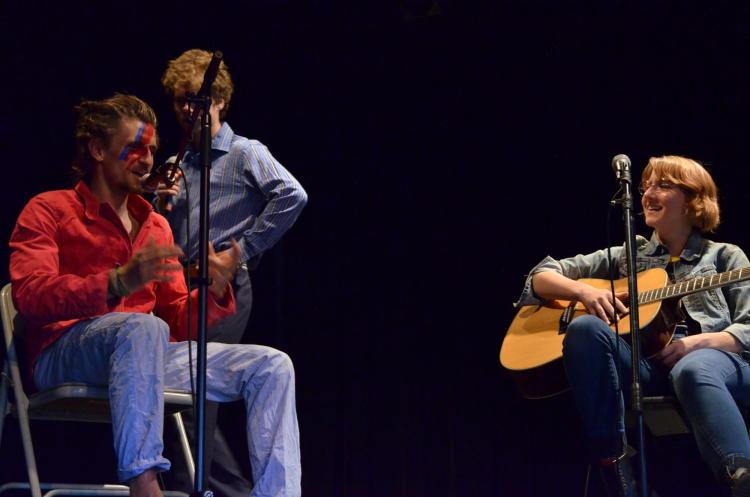What’s so funny about climate change?
Title image: Daniel Hood performs stand-up comedy as a tree (Credit: Chelsea Hackett)
Environmental researchers know the problem all too well: the science on climate change is clear, but people won’t listen. For most people, perusing the latest 500-plus page report on global warming projections is more likely to inspire a nap than a drastic switch to a zero-waste lifestyle.
Beth Osnes and Max Boykoff, associate professors of theatre and environmental studies, respectively, have a suggestion: trade in thesis statements for punchlines.
In 2012, they helped launch the Inside the Greenhouse project at CU Boulder to explore comedy and other unique ways of framing issues surrounding climate change.
As part of the project, students in their spring 2019 Creative Climate Communications class took the stage Thursday to perform climate change-themed comedy in front of a packed Old Main theater. Some student performers were dressed head-to-toe as wind turbines while others took on more traditional stand-up sets.
Good-natured humor about nature

Joey Filmanowicz, Kyle Fowler and Jules Murtha parody David Bowie and The Beatles (Credit: Chelsea Hackett)
While it would be easy to fall into dark humor with the often apocalyptic nature of climate change conversations, Thursday’s show, Stand Up for Climate Change, took a light-hearted approach.
“Climate change especially is an issue associated with gloom and doom, guilt and fear—all negative emotions that most people would much rather avoid than confront,” said Osnes. “Through comedy, we hope to make an encounter with issues surrounding climate a positive one, which we hope will contribute towards more sustained pro-environmental action.”
Students created comedy to specifically communicate one of the Drawdown solutions to reverse global warming—a list of concrete steps to reduce the concentration of greenhouse gases in the atmosphere.
To explore the environmental benefits of switching to a plant-rich diet, for example, a group of students imagined the challenges of selling meat substitutes to a caveman in a modern grocery store.
“A lot of people aren’t taught to talk about that information in a way that will be received by other people,” said Jules Murtha, a senior theatre student who parodied The Beatles’ Let It Be on Thursday. “I think that comedy is a really great way to do that.”
Many in the class, which is typically split between environmental studies, ATLAS and theatre students, went in with little to no performance experience. The idea of a comedy-based final, for most, made syllabus week for scary than funny.
“You could witness the shock on other classmates’ faces because most of them have never performed in their lives,” said Murtha. “When they were told that they would have to get up on stage and try to make people laugh, they were terrified.”
A social experiment
Don’t be fooled by the laughter and silly costumes, Osnes and Boykoff are also conducting real science through the course.
The pair first connected in 2011 and Boykoff says this is the fourth time they’ve been able to teach this class together. Published in January, they drew on that experience in a joint study in Political Geography on the efficacy of communicating climate science through humor.
“This work is showing that we can open up new pathways to discussing, considering and engaging with climate change,” said Boykoff.
While the exact recipe for the class is still evolving after eight years, one ingredient has remained the same: fun.
“If you can create positive association with climate change, you’ve done something right,” said Beth Osnes. “Our goal in doing this is not to make light of the seriousness of this issue, but rather to bring light to a sustainable path forward.”


